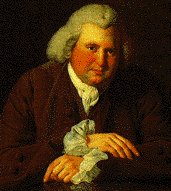Erasmus Darwin
From the Quicksilver Metaweb.
This is an intermediate page for Erasmus Darwin.
Stephensonia
We know Ben Franklin will interact with this Darwin, as they belong to the same clubs.
Authored entries
- Erasmus Darwin (Andrew Berry)
- Stephenson:Neal:Quicksilver:4:...On Sir Isaac Newton's temperature scale... (Alan Sinder)
- Stephenson:Neal:Quicksilver:36:It is the product of five primes. (Gary Thompson)
- Stephenson:Neal:Quicksilver:49: John Comstock, drawn up an Act of Uniformity (Alan Sinder)
Community entry:Erasmus Darwin
From Wikipedia, the free encyclopedia.
Erasmus Darwin (December 12, 1731 - April 18, 1802) trained as a physician and wrote extensively on medicine and botany, as well as poetry. Living in Birmingham and Lichfield, England. He was one of the founder members of the Lunar Society which links him to Ben Franklin.
Erasmus Darwin
He was born near Nottingham, and studied at Cambridge and Edingurgh. He practised medicine in Lichfield in Staffordshire for twenty years; George III invited him to be royal physician but he declined.
His book Zoonomia (1794-6) is widely considered to foreshadow the pre-Darwinian theories of Jean-Baptiste Lamarck, and maybe even the theory of evolution formulated by his grandson Charles Darwin. Another of his grandsons was Francis Galton. His experiments in galvanism inspired Mary Shelley to write Frankenstein.
His poetry was admired by Coleridge and Wordsworth; and often made reference to his interests in science, for example botany and steam engines. His most famous work of poetry was The Botanic Garden.
He was in inventor of several devices, though did not patent any of them. One was a horizontal windmill, which he design for Josiah Wedgwood (who would be Charles Darwin's other grandfather).
He is remembered by the Moonstones in Birmingham.
The Evolutionary Thinker in the Family
Metaweb contributor George Dyson states Erasmus Darwin (Charles's grandfather) was the real evolutionary thinker in the family, that evolution itself has to be intelligent in order to evolve and that reproduction versus replication is one of the great struggles that science needs to understand.[1] In Darwin Among the Machines: The Evolution of Global Intelligence - His hypothesis takes in forest fires and their relationship with neural networks, the possible evolution or otherwise of the first AI computer, the evolution of the World Wide Web and whether or not it mirrors human evolution. He ties this into John Locke, Leibniz, and Samuel Butler which echoes into modern thought on the topic including Richard Feynman's 1959 lecture on nanotechnology.
Erasmus seems to be connected to all the pending nodes of the Industrial Revolution. He was interested and interesting. However, Samuel Butler has it wrong. Charles Darwin may have had a leg up thanks to his grandfathers but that Alfred Russel Wallace also reached similar results shows that Evolution was an idea whose time had come. Had it not been Darwin it may have been the Huxleys. What Butler has right is that we need to look at work of past scientists with more respect.
Key Publications
- The Botanic Garden (1789, 1791: poetic statement of Darwin's scientific theories; second part focuses on plant sexual systems)
- Zoonomia; or, the Laws of Organic Life (1794, 1796: mainly a medical text, also includes the first statement of his evolutionary theory)
- The Temple of Nature; or, the Origin of Society (1803: poetic summation of Darwin's scientific philosophy)
Related entries
- Charles Darwin
- Isaac Newton
- Theory of Evolution
- Christianity
- Albert Einstein
- Carl Linnaeus
- Ben Franklin